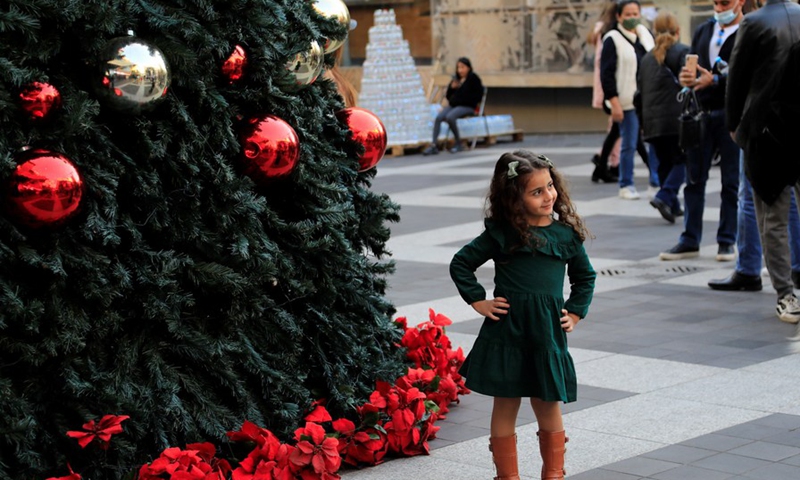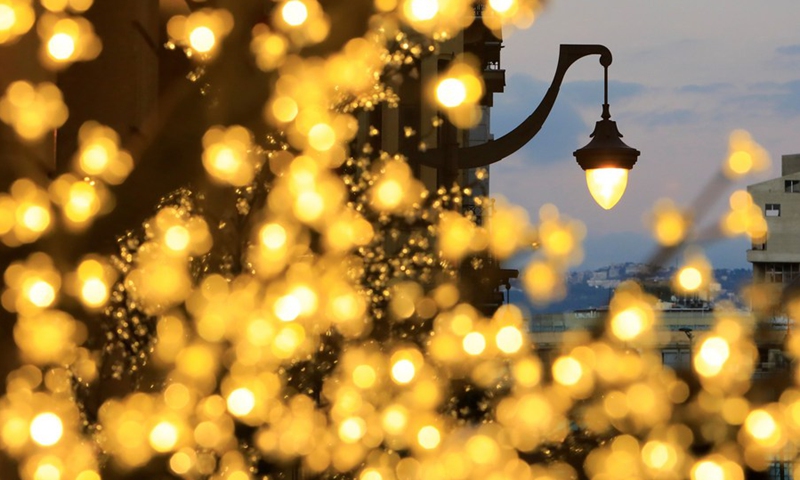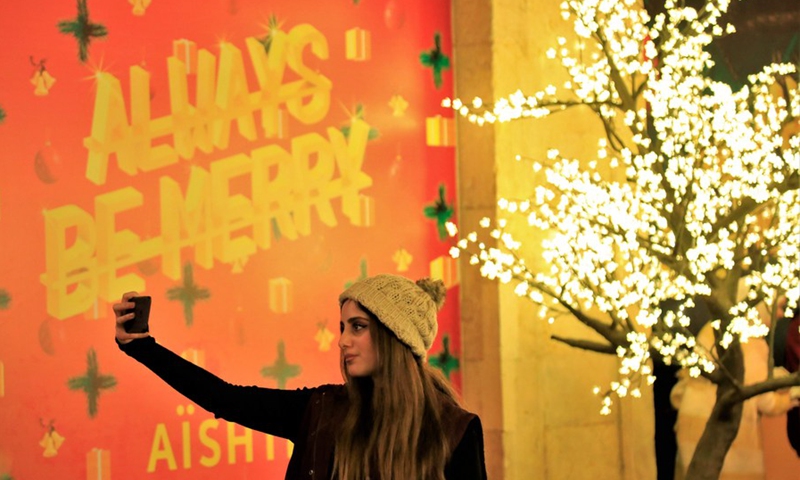
A girl poses for a photo in front of a Christmas tree in downtown Beirut, Lebanon, on Dec. 25, 2021.(Photo: Xinhua)

A child enjoys playing on snow in the Kfardebian region of Lebanon on Dec. 26, 2021.(Photo: Xinhua)

Light installations are seen at a Christmas market in downtown Beirut, Lebanon, on Dec. 25, 2021. (Photo: Xinhua)

A young woman takes a selfie with Christmas decorations in downtown Beirut, Lebanon, on Dec. 24, 2021.(Photo: Xinhua)
Lebanon's hotels suffered from a steep decline in occupancy rate over the past year, but the New Year vacation brings a glimpse of hope for the sector as reservations saw a slight increase in the past few days, Pierre Ashkar, head of the Syndicate of Hotel Owners in Lebanon, told Xinhua.
Ashkar said that the monthly average occupancy rate over the past year stood at around 23 percent but reservations in Beirut hotels for the period extending from Dec. 28, 2021 to Jan. 1, 2022 increased to around 50 percent.
He noted that reservations in the very few hotels in Faraya and Faqra, villages mostly known for their snow slopes, stand at around 75 percent in New Year.
"Most of the demand on hotel rooms in Beirut and in mountain areas during the festive season come from Lebanese expatriates arriving from the Gulf and African countries," Ashkar said.
Ashkar attributes the low occupancy rate in hotels to political instability which forced the United States, Canada and many countries in Europe, to warn their citizens against traveling to Lebanon.
He added that the diplomatic row with Saudi Arabia deprived Lebanon from Gulf tourists who used to spend at least 15 days in the country while allocating a big budget for spending during the Christmas and New Year festive season.
"It's a pity to have lost a big number of tourists from different places," he said.
Ashkar noted that the tourism sector used to generate around 10 billion U.S. dollars in yearly revenues which have dropped to 3 billion U.S. dollars in light of political instability and the outbreak of COVID-19.
"A big number of hotels shut down instead of maintaining their operations and incurring increased losses in the absence of tourists amid the current increase in expenses," Ashkar said.
Hotels interviewed by Xinhua reported a steep decline in occupancy throughout the year except for the New Year's five-day vacation which has seen a recent increase in demand on hotel rooms.
"We have suffered throughout this past year to be able to register an occupancy rate of 35 percent at our hotel, but demand for rooms during the New Year vacation is acceptable," Ayman Nasreddine, operations manager at Cavalier Hotel, a four-star hotel in Hamra, told Xinhua.
"Most of the demand comes from Egyptians at an average room rate at 70 U.S. dollars per night compared to 120 U.S. dollars in the past," Nasreddine said.
Likewise, Rami Fakhreddine, head of Front Desk office at 35 Rooms Hotel in Beirut, told Xinhua that most of the demand for New Year at his hotel comes from Egyptians who now find Lebanon an affordable destination given the collapse of the local currency compared to the U.S. dollars.
"There have also been a lot of packages to Lebanon which saw a great demand by Egyptians," he said.
Dalia Doumani, head of reservations at Riviera, a five-star hotel in Beirut, told Xinhua that reservations at her hotel for New Year reached around 60 percent so far and they are expected to go higher in the coming days.
She noted that even Lebanese expatriates who are paid in U.S. dollars consider prices too high when they convert them into Lebanese pounds in light of the collapse of the local currency which also explains the lower occupancy rates compared to previous years.
